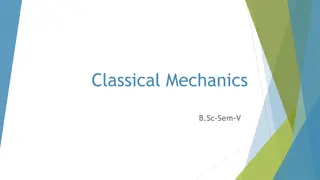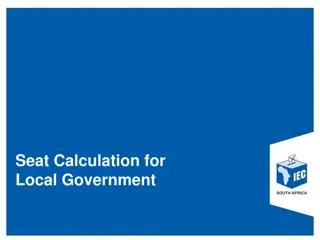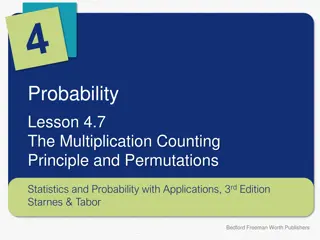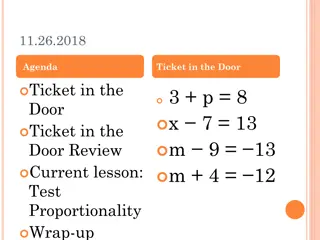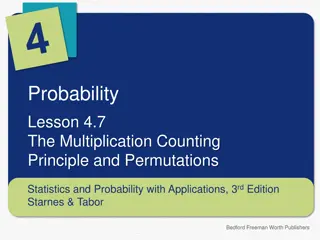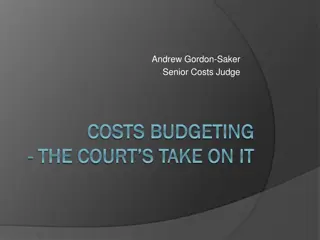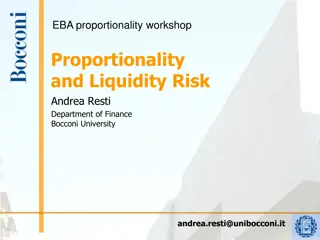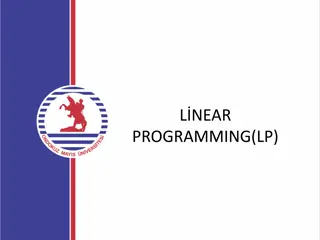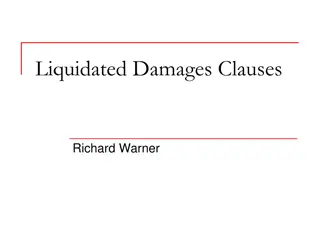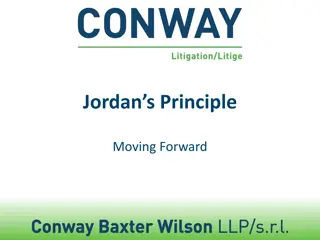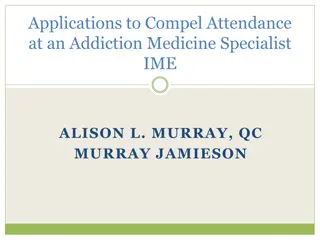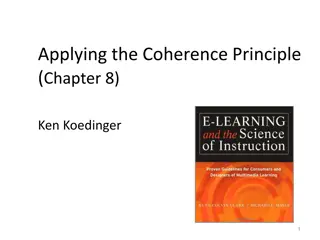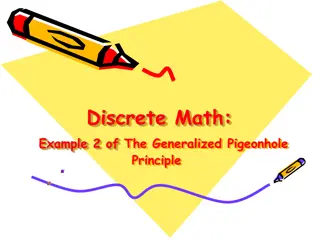Understanding Multiplicative Relationships in Percentages and Proportionality Activities
Engage with a comprehensive set of Checkpoints and additional activities focused on understanding multiplicative relationships, percentages, and proportionality in mathematics. Explore visual aids, problem-solving scenarios, and practical applications to enhance learning outcomes and skills advancem
1 views • 68 slides
JUDICIAL REVIEW OF NATIONAL ACTION BY UNCLOS COURTS AND TRIBUNALS
International judicial review involves oversight by international courts and tribunals over the actions of States Parties in implementing their international commitments. UNCLOS courts exercise supervisory jurisdiction through grounds of review like due regard, reasonableness, necessity, and proport
1 views • 7 slides
Comprehensive Training on Use of Force and Control Tactics
This comprehensive training focuses on legal concepts, civil liability, critical decision-making, de-escalation techniques, and sound control tactics in relation to the use of force and control tactics. Emphasis is placed on the sanctity of human life, proportionality (legally and ethically justifie
0 views • 42 slides
Heisenberg's Uncertainty Principle in Elementary Quantum Mechanics
Heisenberg's Uncertainty Principle, proposed by German scientist Werner Heisenberg in 1927, states the impossibility of simultaneously and accurately determining the position and momentum of microscopic particles like electrons. This principle challenges classical concepts of definite position and m
0 views • 49 slides
Counting Principles and Pigeonhole Principle Explained
Explore the concepts of counting principles and the pigeonhole principle through practical examples and tips. Learn how to apply these principles to solve problems effectively. From understanding basic counting rules to the advanced pigeonhole principle, this content provides insights and guidance o
1 views • 35 slides
Understanding Classical Mechanics: Variational Principle and Applications
Classical Mechanics explores the Variational Principle in the calculus of variations, offering a method to determine maximum values of quantities dependent on functions. This principle, rooted in the wave function, aids in finding parameter values such as expectation values independently of the coor
0 views • 16 slides
Understanding Le Chatelier's Principle in Chemical Equilibrium
Le Chatelier's Principle states that when a system at equilibrium is disturbed by changes in concentration, temperature, or pressure, the equilibrium shifts to counteract the change. This principle can be applied to predict the direction of equilibrium when changes occur. Changes in concentration, p
0 views • 10 slides
Legal Education and Judicial Ethics Seminar - Transforming Legal Cultures
Enhance your understanding of the CPR overriding objective and its interpretative mandates in the legal context. Explore concepts of substantive and procedural justice, principles of proportionality, and the judicial oath of office. Delve into the Supreme Law of the Bahamas, right to protection of t
0 views • 54 slides
Challenges and Opportunities in Judicial Review Costs
CPRE Kent appealed for a fairer costs order in a local plan challenge, seeking better access to justice. Key cases like Mount Cook and Luton highlight the complexities in costs allocation. The appeal to the Supreme Court aims to address these challenges and seeks clarity on the proportionality appro
0 views • 7 slides
Local Government Seat Calculation Framework
The legislative framework in South Africa outlines the seat calculation process for local government elections, emphasizing proportional representation. It involves determining quotas for proportionality, allocating seats based on total party votes, and addressing scenarios where parties may have mo
0 views • 8 slides
Understanding the Multiplication Counting Principle in Probability
The Multiplication Counting Principle and Permutations play a crucial role in determining the number of possible outcomes in various processes. This lesson covers how to use factorials to count permutations, compute arrangements of individuals, and apply the multiplication counting principle to dete
0 views • 14 slides
Understanding Proportional Relationships in Mathematics
Explore the concept of proportionality using graphs, tables, and ratios. Learn how to determine if a relationship is proportional by analyzing ratios y:x and the constant of proportionality. Practice exercises and examples provided for better comprehension.
0 views • 22 slides
Understanding Jordan's Principle and Its Impact on First Nations and Inuit Children in Canada
Jordan's Principle was named in memory of Jordan River Anderson, a young boy whose tragic story led to the establishment of a legal requirement ensuring access to services for First Nations and Inuit children in Canada without delays or disruptions. This principle aims to prevent situations where ch
0 views • 9 slides
Understanding Section 42 Enquiries in Regulated Care Settings
Demystify Section 42 enquiries in regulated care settings with insights, tips, and learning themes. Learn about the safeguarding service, good enquiry practices, incorporating personal safeguarding, recent enquiry themes, tools, and more. Discover how the service works, who can undertake enquiries,
0 views • 20 slides
Understanding Direct Variation in Math
Explore the concept of direct variation in math through an analysis of proportional relationships, constants of proportionality, and graph representation. Practice identifying direct variation and determining the constant of proportionality to interpret the data effectively.
0 views • 20 slides
Advanced Fission Experiments at University of Michigan
The University of Michigan, under the guidance of Dr. Sara A. Pozzi, conducts cutting-edge fission experiments leveraging organic scintillation detectors. These detectors offer advantages such as nanosecond-scale response times, energy proportionality, and scalability. The experiments focus on impro
0 views • 4 slides
Understanding Fluids, States of Matter, and Phase Changes
Exploring key concepts in physics including Bernoulli's Principle, viscosity, cohesion, states of matter (solid, liquid, gas, plasma), phase changes (evaporation, condensation, etc.), density, pressure, and more. Discover the properties and behaviors of fluids in relation to gases and liquids, along
1 views • 54 slides
Understanding the Acceleration of the Universe and the Equivalence Principle Violation in the Horndeski Vector-Tensor Theory
Exploring the implications of the Equivalence Principle Violation after reheating in the context of the accelerated expansion of the universe. The study delves into the Horndeski vector-tensor theory, gravitational waves, and the impact of modified gravity and dark energy. Insights are provided on t
2 views • 20 slides
The Multiplication Counting Principle in Probability: Exploring Permutations
Exploring the multiplication counting principle in probability, this lesson delves into determining the number of ways to complete a process involving multiple steps. Using factorials for permutations, the content showcases how to compute permutations of individuals taken at a time. Through examples
0 views • 20 slides
The Courts' Perspective on Costs Budgeting in Litigation
The senior costs judge expresses concerns about judiciary involvement in managing parties' budgets, highlighting potential inefficiencies and drawbacks. Emphasizing the importance of skilled professionals working efficiently, the article underscores the need for more costs education for judges to ac
1 views • 11 slides
Understanding Use of Force and Control Tactics Training
Explore the legal aspects, civil liability, decision-making practices, de-escalation techniques, and control tactics related to use of force. Emphasizes the sanctity of human life, proportionality in force application, and justifications under the U.S. Constitution and statutes. Examines the criteri
0 views • 42 slides
Understanding Hardy-Weinberg Principle and Genetic Frequencies
Gene pool and allele frequencies play a crucial role in the Hardy-Weinberg Principle, a mathematical model predicting allele frequencies over generations. The principle outlines conditions like a large population, absence of mutations, random mating, and more. Equations such as p² + 2pq + q² = 1 h
0 views • 44 slides
Understanding the Constant of Proportionality in Real-Life Scenarios
Explore examples involving the constant of proportionality, also known as the unit rate, to understand how relationships between quantities can be represented. In these scenarios, calculations revolve around baking cookies for a school's Bake Sale and spending money on bowling games, showcasing how
0 views • 5 slides
Proportionality Principle in Liquidity Risk Management
The concept of proportionality is essential in evaluating measures related to liquidity risk management in the banking sector. The principle emphasizes the necessity for measures to be appropriate, necessary, and not disproportionally disadvantageous. By applying a 3-stage test, institutions can ens
1 views • 10 slides
Overview of EU Criminal Law Changes After Lisbon Treaty
The Lisbon Treaty signed in 2007 brought significant changes to EU criminal law, moving cooperation from the EU Treaty to the Treaty on the Functioning of the EU. It abolished the pillar structure, expanded the CJEU's competences in criminal law, and emphasized the area of freedom, security, and jus
0 views • 28 slides
European Social Policies and EU Limits: A Comprehensive Overview
EU social policies are guided by the principle of subsidiarity, ensuring decisions are made close to the citizens. The EU's role is to set framework conditions and compensatory programs, while social policy largely remains the responsibility of individual member states. The Union can act in a policy
0 views • 16 slides
Principle of Majority Rule in Company Law
The principle of majority rule is a fundamental aspect of company law, where the powers of control over a company rest with the general meeting representing the majority shareholders. This principle emphasizes that decisions are made by a simple or special majority vote, except for powers vested in
0 views • 9 slides
Proportionality as Core Principle in Supervising Heterogeneous Banking Sectors: Lessons from Germany
The supervision of a diverse banking sector, such as Germany's with roughly 2,000 banks, is based on the core principle of proportionality. This approach involves tailoring regulations and oversight to fit the individual characteristics of each institution, focusing on qualitative aspects, organizat
0 views • 8 slides
Linear Programming in Quantitative Problem-solving
Linear Programming (LP) is a powerful tool for solving quantitative problems, providing solutions for a wide range of scenarios such as farm planning, stock control, and financial planning. This method involves defining objectives, alternatives, and resources to maximize income or minimize costs eff
0 views • 63 slides
Understanding Liquidated Damages Clauses in Contracts
Liquidated damages clauses serve to determine a precise amount of damages in case of contract breach when actual damages are difficult to ascertain. Courts enforce such clauses if they meet certain criteria based on reasonability and proportionality. Historical hostility towards these clauses has le
0 views • 17 slides
Jordan's Principle: Advocating for First Nations Children's Rights
Jordan's Principle is a vital advocacy tool aimed at ensuring equitable access to necessary services for First Nations children, emphasizing prompt resolution of jurisdictional disputes. Originating from the story of Jordan River Anderson, its implementation has faced challenges and legal battles. C
0 views • 21 slides
The Capital Punishment Process: Aggravators, Mitigators, and Post-Conviction Appeals
The continuation of the discussion on the capital punishment process, specifically focusing on the bifurcated trial, the consideration of aggravators and mitigators, post-conviction appeals including direct appeal and Habeas Corpus appeals, and the importance of proportionality review in state supre
0 views • 25 slides
Compelling Attendance at Addiction Medicine Specialist IME
Court orders for examination by medical practitioners in cases where physical or mental conditions are in question. Examples of cases where plaintiffs were ordered to provide blood and urine samples due to alleged addiction issues. Instances where addiction issues were discovered through evidence an
0 views • 13 slides
Understanding the Pigeonhole Principle in Mathematics
The Pigeonhole Principle, demonstrated through examples and explanations by Dr. J. Frost, illustrates the concept that if you have more "pigeons" than "holes," then at least one "hole" must contain multiple "pigeons." This fundamental principle is essential in solving various mathematical problems i
0 views • 27 slides
Understanding the Reciprocity Principle in Public Procurement Markets
The concept of reciprocity in access to public procurement markets, particularly in the European Union, has gained prominence in recent years. This principle involves mutual opening obligations for public procurement markets while considering concessions and exceptions, such as excluding defense and
0 views • 4 slides
Writing Lab: Principal vs. Principle
Learn the differences between "principal" and "principle" with this informative Writing Lab mini-lesson. Understand their varied meanings as nouns and adjectives, and how they are used in different contexts. Enhance your diction skills and avoid common usage errors. Enjoy learning about the principa
0 views • 4 slides
Water-Energy Nexus Cost Allocation Workshop Insights
Workshop discussion focuses on proportional cost allocation among energy IOUs and water agencies based on benefits realized. Emphasis on avoiding cross-subsidies and considering strict proportionality where benefits match or exceed costs. Debate on relaxing proportionality for energy ratepayer subsi
0 views • 16 slides
Enhancing Student Learning Through Coherence Principle
The Coherence Principle emphasizes the importance of excluding extraneous, entertaining materials to improve student learning. Including such materials can compete for cognitive resources and divert attention from essential information. Utilizing simpler visuals and avoiding websites that violate th
0 views • 7 slides
Understanding Death Eligibility Laws and Proportionality in Criminal Justice
Exploring the concept of proportionality in death eligibility laws, focusing on the narrow targeting of offenders and the assessment of cases for the death penalty. Examples and discussions from legal cases and studies are presented to evaluate the effectiveness and fairness of these laws.
0 views • 28 slides
Understanding the Generalized Pigeonhole Principle in Discrete Math
The Generalized Pigeonhole Principle is illustrated through an example involving selecting cards from a deck. By strategically grouping the cards, we determine the minimum number needed to guarantee at least three cards of the same suit are chosen. Additionally, the process is applied to finding the
1 views • 5 slides





